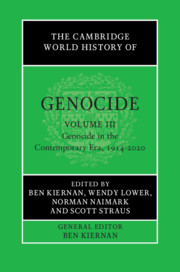Book contents
- The Cambridge World History of Genocide
- The Cambridge World History of Genocide
- The Cambridge World History of Genocide
- Copyright page
- Contents
- Figures
- Tables
- Maps
- Contributors to Volume III
- Introduction to Volume III
- Part I Racism, Total War, Imperial Collapse and Revolution
- Part II World War Two
- Part III The Nation-State System during the Cold War
- 17 Genocide in Latin America, 1950–2000
- 18 China under Mao, 1949–1976
- 19 Half a Century of Genocide and Extermination
- 20 Secession and Genocide in the Republic of Biafra, 1966–1970
- 21 Bangladesh, 1971
- 22 The Genocides in Cambodia, 1975–1979
- 23 The Guatemalan Genocide
- 24 Mass Violence and the Kurds
- 25 Vulnerable Peoples in the Contemporary Era
- Part IV Globalisation and Genocide since the Cold War
- Index
20 - Secession and Genocide in the Republic of Biafra, 1966–1970
from Part III - The Nation-State System during the Cold War
Published online by Cambridge University Press: 23 June 2023
- The Cambridge World History of Genocide
- The Cambridge World History of Genocide
- The Cambridge World History of Genocide
- Copyright page
- Contents
- Figures
- Tables
- Maps
- Contributors to Volume III
- Introduction to Volume III
- Part I Racism, Total War, Imperial Collapse and Revolution
- Part II World War Two
- Part III The Nation-State System during the Cold War
- 17 Genocide in Latin America, 1950–2000
- 18 China under Mao, 1949–1976
- 19 Half a Century of Genocide and Extermination
- 20 Secession and Genocide in the Republic of Biafra, 1966–1970
- 21 Bangladesh, 1971
- 22 The Genocides in Cambodia, 1975–1979
- 23 The Guatemalan Genocide
- 24 Mass Violence and the Kurds
- 25 Vulnerable Peoples in the Contemporary Era
- Part IV Globalisation and Genocide since the Cold War
- Index
Summary
The Nigerian Civil War, also known as the Nigeria–Biafra War, was fought between the Federal Republic of Nigeria and its breakaway eastern province from 1967 to 1970. The Republic of Biafra’s secession in May 1967 was a response to widespread violence against members of the Igbo ethnic group. Igbos constituted a long-standing internal diaspora across the Nigerian federation, especially its Northern Region. The Eastern Region, where most Igbo people had their ancestral homes, seceded in the name of protecting their lives and interests. The secessionist government argued that a genocide was taking place, citing the fact that Nigerian soldiers and police had participated in the killings of Igbos the previous year. They also argued that Nigeria pursued a genocidal strategy in the war that followed. Biafra’s status as a genocide was contested at the time, and it remains so in historical memory. Its importance as a case study lies not only in the particularities of its violence, but in what it reveals about how genocide claims can be instrumentalised.
- Type
- Chapter
- Information
- The Cambridge World History of Genocide , pp. 476 - 496Publisher: Cambridge University PressPrint publication year: 2023
- 1
- Cited by



